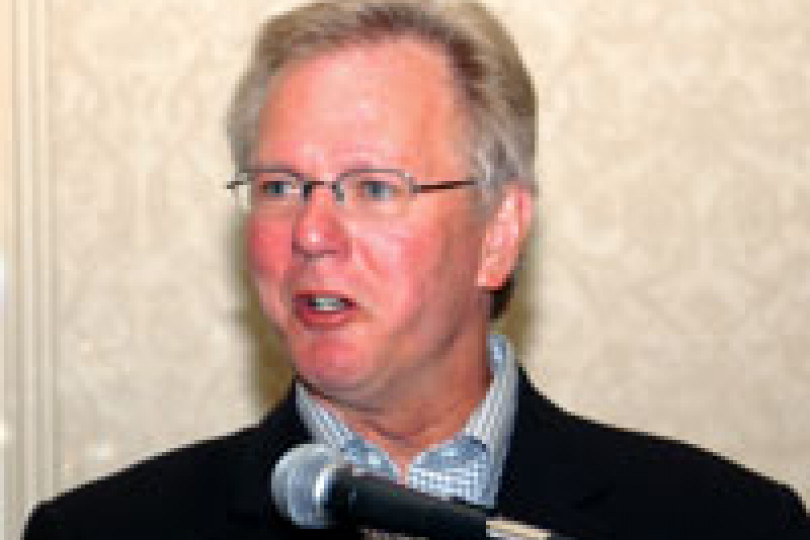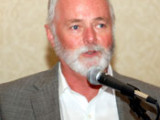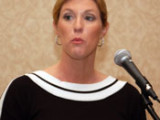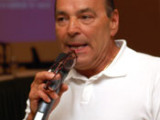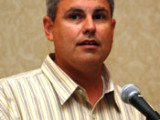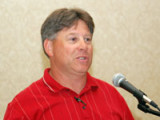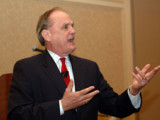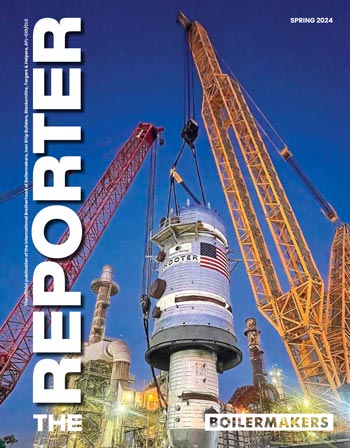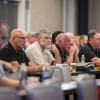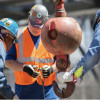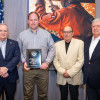IP Newton Jones discusses the future of coal.
View Photo Gallery (7 photos)
March conference keys on elections, national funds, coal technology
BOILERMAKERS ATTENDING THE annual Construction Division conference in Marco Island, Fla., March 2-7 found plenty of information to digest. From the national elections, to major changes at our national funds office, to the future of coal, and more, lodge leaders heard about changes that are unfolding and will impact their locals and their members.
IP Jones calls work outlook “phenomenal”
IN HIS OPENING remarks, Intl. Pres. Newton B. Jones said, “The outlook for our union and for Boilermaker craftsmen over the next eight-to-10 years is phenomenal. It’s a great time to grow this organization and to rebuild our skills.
“We’re going to lose a lot of people through attrition,” he cautioned. “And there appears to be some difficult economic times ahead. But that doesn’t mean we won’t have a lot of good work available to our members.” He said adding new apprentices and signing up workers through the MOST recruitment program are essential goals.
“A key issue on the horizon is global warming,” he added, “and how that’s going to impact Boilermaker work. There is a lot of opposition now to coal-burning boilers. In some cases those opposing coal have stopped the construction or permitting of some of those units.”
Jones said both of the Democratic candidates for president support investing in clean coal technology. “If this country wants to be energy independent, you cannot ignore 200-300 years of coal reserves.”
Reporting on membership and finances, Intl. Sec.-Treas. Bill Creeden said, “We had 5,034 initiations and reinstatements in the first six months of this fiscal year, but the membership overall is flat. The attrition rate is running about the same. So we’ve got to initiate at least 2,500 people a quarter to stay even.”
Creeden said most of the Brotherhood funds are in the black, including the General Fund, Construction Division, NTD, and Consolidated funds.
“The Railroad Fund is slightly in the red, and I’m really pleased to report that, with the action taken at the last convention by our delegates to change the Cement Division dues structure, we’re only $33,000 in the red now for the first seven months of the year.” The fund had been running about $100,000 a month in the red, he said. “I think by this time next year we’ll be well in the black.”
Presidential candidates are hot topic
WITH A HEATED election year underway, the race for the White House was a hot topic at the conference. Intl. Pres. Jones discussed the International Executive Council’s decision to endorse Sen. Barack Obama. He noted that the Boilermakers union was one of the earliest labor groups to endorse him. “Coming on board early will hopefully mean that we have a seat at the table for our issues,” he said. “From an organizational standpoint, it made good sense for us to endorse the senator.”
Jones said some local leaders and members “may have a different opinion. And we respect that.” Several Boilermakers expressed their support for Sen. Hillary Clinton during the political action portion of the meeting.
Both Jones and Dir. of Government Affairs Bridget Martin praised the Democratic candidates seeking the party’s nomination, noting that either Obama or Clinton would be a superb choice. Martin said she expected the Democratic Party to rally around the eventual nominee.
Martin stressed the importance of defining John McCain, focusing on how closely he has aligned himself with Pres. Bush’s policies and his anti-union voting record.
Funds office expands capability
THE NATIONAL FUNDS office announced sweeping changes to its operations. A new Customer Care Center, new phone system, and expanded staffing are reducing wait times for Boilermakers and health care providers calling for information and approvals.
The office also explained adjustments being considered to the Boilermaker-Blacksmith National Pension Fund when the board of trustees meets in June.
Panel reports on CO2 capture, sequestration
THE FUTURE OF construction Boilermakers is closely tied to developing technologies in carbon dioxide capture and sequestration, Skipper Branscum told the conference. Branscum, Dir. of Construction Division Services, led a discussion panel that included Intl. Reps Jim Cooksey, John Fultz, Clay Herford, Norm Ross, Steve Speed, and Marty Stanton.
Branscum reviewed how technology has evolved since the 1950s to control emissions from power plants and other industrial processes. From bag houses and precipitators for particulate matter, to scrubbers for sulfur dioxide, to selective catalytic converters for nitrogen oxide, environmental systems have been a staple of Boilermaker work for decades. Now, Branscum said, the emphasis is to find methods to control carbon dioxide.
The panel reviewed various approaches being tested by industry, universities, and the government to capture and sequester CO2. Among the technologies examined were amine solutions and chilled ammonia methods of CO2 extraction following combustion; coal gasification, including underground gasification; methane and other commercial product development from coal; pumping CO2 into oil and gas wells to enhance extraction; and permanently storing CO2 in brine-saturated aquifers deep below the ground. Panelists discussed the equipment that would be involved in the various capture methods and the jurisdictional issues that may arise among the crafts.
Branscum said some of the technology being discussed could become commercially available within the next four or five years, resulting in substantial new environmental work for Boilermakers. However, the high cost of these technologies, as they exist today, present a major challenge to the industries that would use them.
Abe Breehey, Assist. Dir. of Government Affairs, said CO2 capture and sequestration (CCS) hold the promise for “huge amounts of work for our construction Boilermakers.”
Breehey spoke about climate change and how it might impact trade, legislation, and policy in the United States. “Regardless of who our next president is, we’re going to see a climate change bill get passed and signed by the president,” he said. “Our priorities are to bridge the environmental goals to achieve carbon reduction with the development of the new technologies. The risks are that if you demand too much reduction too fast, utilities may try to achieve them by fuel-switching to more expense natural gas — or by closing older, dirtier coal plants rather than upgrading them, causing a loss of Boilermaker work.”
The Boilermakers are taking the lead before Congress in identifying labor’s issues related to climate change policy and legislation. Breehey has testified before a congressional committee to that effect. The Boilermakers support the Bingaman-Specter bill that would control carbon emissions through a cap and trade policy.
Conference explores Web-based referral concept
TRAVELING BOILERMAKERS or “boomers” often drive hundreds of miles to put their names on job referral lists, IP Jones told the conference. Not only is the process costly — especially with high gas prices — but it is also time consuming, he said. Canadian Boilermakers have resolved the problem by creating a Web-based system that allows workers to sign up via the Internet.
On March 4, Jayne Clemance of JBS Systems demonstrated how that system might be adapted for American Boilermakers. IP Jones, Intl. Vice Presidents Joe Maloney, Ed Power, and George Rogers, and Intl. Sec.-Treas. Creeden participated in the presentation.
An online referral system would allow workers to enter and update information by using a computer or other device that has Internet connectivity. Boilermakers would create a password-protected profile. They could view online job calls and add their names to referral lists. Dispatchers could place job calls online, view workers who have responded, and make selections to fill jobs.
The 24-7 access to this information would greatly enhance the way construction Boilermakers sign up for work, Jones said. The system would also generate statistical data that owners and contractors need to plan their projects.
Jones said a committee will be formed to make recommendations about the system, including what changes may be needed to the referral rules.
MOST initiatives show progress
TWO INITIATIVES UNDERTAKEN by MOST (Mobilization, Optimization, Stabilization, and Training) were reviewed at the conference. These included the manpower tracking program and the recruiting program.
Larry Wargo, consultant for contractor services with First Energy, gave an update on the manpower tracking program. The Web-based program is being developed to help owners, contractors, and local lodges assess the availability of construction Boilermakers and forecast manpower demands.
Wargo, who heads the MOST committee for developing the software, said many locals have begun entering information and generating reports. He said the committee’s goal is to have all local lodges using the system by August.
“We’re going to be opening this up to contractors and owners, issuing sign-ons and allowing them to input job-related data,” Wargo said. “It would be nice to have all the locals online and understanding how to use the database, because there’s going to be a lot of information coming in that locals are going to have to deal with.”
IP Jones said he foresees a need to integrate the manpower tracking program with the new online referral program that is being discussed. Such integration would mean that the local lodges, contractors, and owners would have an accurate, real-time picture of where Boilermakers are working, how many are available for work, how their qualifications match up with future work, and what shortfalls might exist. This information could be examined at various levels: local lodge, region, or vice presidential area.
Jones said the recruiting program needs to be embraced by all locals so shortfalls in manning projects can be minimized. “We still see a lot of empty spots on our jobs,” he said. “That’s work not being done. That’s opportunity for others to take those spots. We simply have to do whatever it takes to get those spots filled,” he said.
Jones said the IEC is exploring innovative ways to improve the skills of recruits as rapidly as possible and to attract them away from nonunion employers. “We are trying to think outside the box here and see what will work to get these jobs manned.”
Healthy Brotherhood Bank offers new credit card
CAL ROBERTS, PRESIDENT of the Brotherhood Bank and Trust, reported the bank “is very healthy,” coming off the best January the organization has ever had. “I’m also happy to tell you the bank does not have one sub prime loan,” he said. Sub prime loans are mortgage loans made to high-risk borrowers. They are considered a major cause of the current housing market crash.
Roberts reported that the bank will soon offer a credit card just for Boilermakers, called the Brotherhood Advantage Gold Card. He emphasized that the card is entirely different from the one offered through the Union Plus program.
The Brotherhood card will offer an interest rate floating at 3.75 percent over prime. It will include a variety of benefits, such as bonus dividends, rental car discounts, and car key registration (for speedy return if keys are lost).
Roberts said the bank will mail application forms to local lodges for distribution to members.
Other bank products in the works include a bill-paying service and direct deposit of payroll checks.
Staff presents tips for handling grievances
SEVERAL INTERNATIONAL STAFF members offered tips and advice for processing grievances. David Haggerty led the discussion with an explanation of how grievances are handled under the National Maintenance Agreement (NMA) and the General Presidents’ Agreement (GPA).
Haggerty is Assistant to the International President for the Building and Construction Trades Department and is also Director of the National Construction Agreements. He works out of Washington, D.C. Haggerty recommended that business managers obtain a copy of the Grievance Handbook, available through the Communication, Education, and Training Services Department.
Jim Pressley, Dir. of the Industrial Sector Services Department, added that the ISSD is another excellent resource for grievance assistance. He said his department has access to databases on grievance awards as well as arbitrators. “Whatever topic — absenteeism, drug and alcohol policy, sexual harassment, you name it — we can research that issue.”
BMs hear about other resources
A SIGNIFICANT BENEFIT for business managers attending the conference is exposure to different kinds of resources that can help their lodges or individual members.
At this year’s event, business managers heard about SERT services, PEC reports, leadership training, and weld ventilation training.
SERT, or Special Emergency Response Team, is a legal service provided by the law firm Becker, Galanti, and Schroeder, based in Southern Illinois. Attorney Todd Schroeder explained that when a serious accident injures or kills a member, the member and his family are often overwhelmed by the event. He said his firm can arrive on the scene quickly, secure evidence, interview witnesses, and take other steps to protect the interests of the injured member and his family. Additional information on SERT is available by calling 800-222-0957 or via e-mail at LAWmail@BeckerInjuryLaw.com.
Business managers can also benefit from an extensive online database of industrial projects available through Industrial Info Resources (www.industrialinfo.com). The company offers extensive reports, dubbed PEC reports for the different project phases (planning, engineering, and construction). The firm’s Lamar Blanton provided an update of services available to Boilermakers.
Donald Caswell, Director of the Communications, Education, and Training Services Department, reported on training that will be available this year for local lodge leadership. “Shortly following local lodge elections, we’re going to be offering a class for new business managers,” he said. The training will be held Jul. 27-Aug. 1. He said training for business manager assistants will be offered in years when new business manager training is not held. Both types of training will be held in the summer, the week after the Boilermakers’ sessions at the School for Workers in Madison, Wis. Caswell said training for other local lodge officers will also be provided this year, although dates have not yet been set.
Mike Peterson, Director of the Southeast Area Joint Apprentice Committee, discussed another resource for local lodges — a firm called VenteX® , out of Tampa, Fla (www.ventex.com). A Boilermaker-founded and operated company, VenteX® manufactures fume removal and particulate scrubbing systems. VenteX® President Cecil Rush, described the systems and noted that setting up and operating them is Boilermaker work.
Conference addresses reorganization
INTL. PRES. Jones reviewed the substantial reorganization that has been taking place within our organization. The reorganization has included the allocation of jurisdiction for the Cement and Stove Divisions to each vice presidential area and assigning staff on a geographical rather than a divisional basis. Additionally, the National Transient Lodge is being integrated into various construction lodges.
“There was no easy answer, but we knew we could not leave it as it stood,” Jones said. “The National Transient Division remains a division of the Brotherhood; the jurisdiction remains with the Division, but each of you now as a business manager has responsibility for that work under those agreements.” Jones acknowledged that many issues remain in working out the details of the NTL integration with respect to member skill levels, work history, and other areas. In a question-and-answer session with business managers, many in the audience discussed how they were handling the integration and identified specific problem areas they have encountered. Jones also noted that some local lodges have been realigned, particularly in the Western States.
“I think we’re going to see much better representation for our membership and I think better policing of our jurisdiction with those efforts,” he said. “We are an organization that needs to be as efficient as possible. We’ve tried to make that effort, and we’ll continue to do that.”
Futch speaks on change
WITH SO MUCH change being discussed at the conference, it was perhaps fitting that the event’s inspirational speaker chose change as his topic. Ken Futch explained why people resist change and how leaders can help others to embrace it.
A Vietnam War veteran and former national trainer with AT&T, Futch titled his talk “Holding on or Grabbing on.” He said it’s natural for people to hold on to what they know and are comfortable doing. “Anytime we’re asked to change, we know for sure what we’re giving up, but we don’t know for sure whether the new situation will be better.”
Futch said leaders must help others visualize themselves performing successfully in a new environment. “There’s an old saying in the sales business that goes like this: If you say it, they doubt it, but if they say it, they believe it. It is so powerful, asking people questions and letting them make their own decisions as opposed to telling people.”
Futch also stressed that people undergoing change need feedback and positive reinforcement. “Share with them some of the strengths you think they have,” he advised. “Let them know you believe in them. Encourage them to grab on to the new and not hold on to the past.”
Paid for by the International Brotherhood of Boilermakers Campaign Assistance Fund, [phone: (703) 560-1493] and is not authorized by any candidate or candidate's committee.

